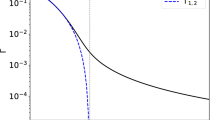Abstract
The phenomenon of exchange degeneracy of 2-particle quantum states is studied in detail within the framework of Relativistic Schrödinger Theory (RST). In conventional quantum theory this kind of degeneracy refers to the circumstance that, under neglection of the interparticle interactions, symmetric and anti-symmetric 2-particle states have identical energy eigenvalues. However the analogous effect of RST degeneracy is rather related to the emergence of two types of mixtures (positive and negative) in connection with the vanishing or non-vanishing of certain components of the Hamiltonian (“exchange fields”). As a consequence, there arise two subcases of RST degeneracy: (i) mixture degeneracy through neglection of the exchange fields and (ii) exchange degeneracy through neglection of the mixture character of matter. The latter RST exchange degeneracy consists in the fact that the RST dynamics admits a certain set of pure-state solutions, as borderline case between positive and negative mixtures, and all these different solutions are generating the same physical situation, e.g., concerning mass eigenvalues and physical densities (of current and energy-momentum). The general results are exemplified by considering the 2-particle states for (scalar) Helium. Analogously as the conventional exchange degeneracy is broken (ortho- and para-Helium) by taking into account the interparticle interactions (e.g., Coulomb forces), the RST degeneracy is broken by simultaneously taking into account the mixture character of matter together with non-zero exchange fields.
Similar content being viewed by others
REFERENCES
W. Pauli, Z. Phys. 31, 765 (1925), reprinted in Ref. 2.
I. Duck and E. C. G. Sudarshan, Pauli and the Spin-Statistics Theorem (World Scientific, 1998).
L. E. Ballentine, Quantum Mechanics (World Scientific, 1998).
T. Sudberry, Nature 348, 193 (1990).
S. Rupp and M. Sorg, Int. J. Theor. Phys. 40, 1817 (2001).
S. Rupp and M. Sorg, Phys. Rev. A 63, 022112 (2001).
D. I. Blochincev, Quantum Mechanics (Reidel Dordrecht, 1964).
S. Gasiorowicz, Quantum Physics (Wiley, 1974).
A. Böhm, Quantum Mechanics (Springer, 1979).
Y. Ohnuki and S. Kamefuchi, Quantum Field Theory and Parastatistics (Springer, 1982).
M. D. Girardeau, Phys. Rev. B 139, 500 (1965).
J. W. Gibbs, Elementary Principles in Statistical Mechanics (Dover, 1960).
J. M. Leinaas and J. Myrheim, Nuovo Cimento B 37, 1 (1977).
F. Wilczek, Fractional Statistics and Anyon Superconductivity (World Scientific, 1990).
R. W. Childers, Phys. Rev. D 26, 2902 (1982).
J. Sucher, Phys. Rev. Lett. 55, 1033 (1985).
J. Bijtebier and J. Broekaert, Nuovo Cimento A 105, 351 (1992).
F. Gross, Phys. Rev. C 26, 2203 (1982).
M. Sorg, Nuovo Cimento B 112, 23 (1997).
M. Sorg, J. Phys. A 30, 5517 (1997).
M. Mattes and M. Sorg, J. Phys. A 32, 4761 (1999).
W. Heisenberg, The Physical Principles of the Quantum Theory (Dover, 1930).
U. Ochs and M. Sorg, Gen. Rel. Grav. 28, 1177 (1996).
T. Sigg and M. Sorg, Gen. Pel. Grav. 29, 1557 (1997).
M. Mattes and M. Sorg, J. Math. Phys. 40, 71 (1999).
M. Mattes, S. Rupp, and M. Sorg, Can. J. Phys. 79, 879 (2001).
J. A. Wheeler and W. H. Zurek, eds., Quantum Theory and Measurement (Princeton University Press, 1983), p. 58.
L. F. Abbott and S. Y. Pi, Inflationary Cosmology (World Scientific, 1986).
E. W. Kolb and M. S. Turner, The Early Universe (Addison-Wesley, 1990).
M. Mattes, U. Ochs, and M. Sorg, Int. J. Theor. Phys. 35, 155 (1996).
W. Greiner, Relativistic Quantum Mechanics (Springer, 2000).
Author information
Authors and Affiliations
Rights and permissions
About this article
Cite this article
Rupp, S., Hunzinger, S. & Sorg, M. Exchange Degeneracy of Relativistic Two-Particle Quantum States. Foundations of Physics 32, 705–750 (2002). https://doi.org/10.1023/A:1016004909327
Issue Date:
DOI: https://doi.org/10.1023/A:1016004909327



